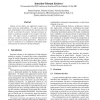148 search results - page 22 / 30 » Self-stabilization of Byzantine Protocols |
ASIACRYPT
1999
Springer
14 years 2 months ago
1999
Springer
Problems of secure communication and computation have been studied extensively in network models. Goldreich, Goldwasser, and Linial, Franklin and Yung, and Franklin and Wright have...
SP
2002
IEEE
13 years 9 months ago
2002
IEEE
Despite our best efforts, any sufficiently complex computer system has vulnerabilities. It is safe to assume that such vulnerabilities can be exploited by attackers who will be ab...
FOCS
2006
IEEE
14 years 3 months ago
2006
IEEE
We consider the problems of Byzantine Agreement and Leader Election, where a constant fraction b < 1/3 of processors are controlled by a malicious adversary. The first problem...
ICALP
2005
Springer
14 years 3 months ago
2005
Springer
This paper presents a new protocol for atomic broadcast in an asynchronous network with a maximal number of Byzantine failures. It guarantees both safety and liveness without maki...
JOC
2007
13 years 9 months ago
2007
A Private Information Retrieval (PIR) protocol allows a user to retrieve a data item of its choice from a database, such that the servers storing the database do not gain informat...

